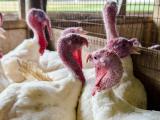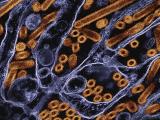Jan 21, 2005 (CIDRAP News) – Authorities are investigating the possibility of human-to-human transmission of avian influenza in two newly confirmed cases in middle-aged brothers in northern Vietnam, the World Health Organization (WHO) said today.
Tests have confirmed avian flu in a 46-year-old man from Thai Binh province who died Jan 9 and in his 42-year-old brother, a Hanoi resident who is recovering in a hospital, the WHO said. Earlier reports had said the older man (previously listed as 45 years old) had tested negative for the virus.
The agency said the younger man might have acquired the disease from his brother—or both brothers might have been infected when they shared a family meal that included a dish containing raw duck blood and raw organs. Vietnamese officials are investigating the cases, the WHO said.
An Agence France-Presse (AFP) report today said another brother, age 36, was also in a hospital with suspected avian flu. But the WHO said media reports of illness in the third brother have not been confirmed.
The AFP story mentioned a possibility that the 42-year-old man became infected when he visited his older brother in a hospital.
The WHO has warned repeatedly that the H5N1 avian flu could spark a pandemic if it acquired the ability to spread easily from person to person. All but one of the confirmed cases recognized in Vietnam and Thailand since January 2004 are believed to have resulted from exposure to sick poultry.
A finding that the 42-year-old caught the disease from his brother, if it emerged, would not necessarily be a cause for alarm, the WHO said.
"All evidence to date suggests that isolated instances of limited, unsustained human-to-human transmission can be expected from avian influenza viruses in humans," the agency said. "Their occurrence does not call for any change in the present level of pandemic alert. Intensified surveillance for respiratory symptoms in close contacts of the two men has been initiated in both Thai Binh Province and Hanoi and it is reassuring that no cases of respiratory illness have so far been detected among these people."
Public health officials in Vietnam have repeatedly warned against eating food made with fresh duck blood or raw or inadequately cooked poultry products, the WHO said. The agency said people in all countries dealing with outbreaks of H5N1 avian flu should avoid such foods.
Proper cooking of poultry—to an internal temperature of 70°C—destroys the virus, the WHO said.
The two newly confirmed cases bring the total in Vietnam since mid-December to eight, of which seven have been fatal, the WHO said. The WHO case count currently lists 52 confirmed cases, including 39 deaths, in Vietnam and Thailand since January 2004.
See also:
Jan 21 WHO statement
http://www.who.int/csr/don/2005_01_21/en/



















